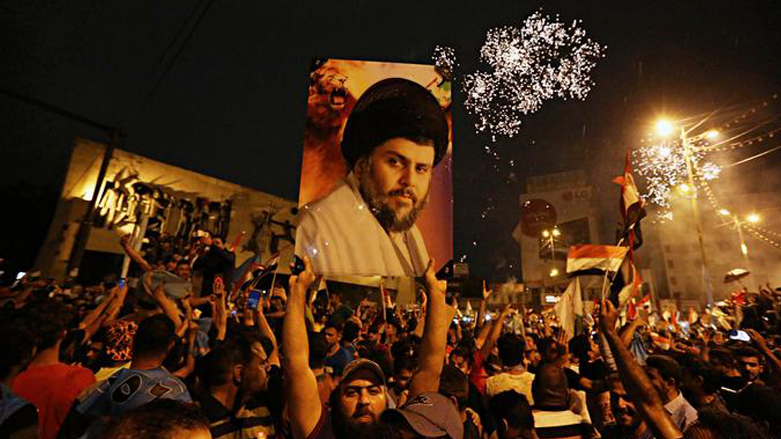Sadr's latest move shakes up Iraq's political landscape
The question is whether the KDP and the Al-Siyada will decide to work with the SCF to form the next government and whether they will participate in that government.

ERBIL (Kurdistan 24) – Sadrist Movement leader Muqtada al-Sadr ordered the closure of all aside from six of his movement's offices "at the current stage" on Sunday following the resignation of all his movement's 73 members of parliament earlier in the day.
Sadr called on Hassan al-Adhari, the head of the Sadrist bloc in parliament, to submit the resignations of his bloc's deputies.
The Holy Shrine Foundation, the Martyr's Office, Sadr's Office, the Antiquities Body, the Solid Structure Project, and the Martyr Museum are the six offices Sadr decided to keep open.
Sadr previously said that submitting the resignations was "a sacrifice on my part for the country and the people to rid them of an unknown fate."
Speaker of the Iraqi Parliament Mohammed Al-Halbousi, "reluctantly" accepted the resignations of the 73 Sadrist members of the Iraqi Parliament on Sunday.
In a tweet, Halbousi said that upon "the desire of His Eminence, Muqtada al-Sadr, we reluctantly accepted the requests of our brothers and sisters, the Sadrist bloc's representatives, to resign from the Iraqi parliament."
نزولاً عند رغبة سماحة السيد مقتدى الصدر، قبلنا على مضض طلبات إخواننا وأخواتنا نواب الكتلة الصدرية بالاستقالة من مجلس النواب العراقي. لقد بذلنا جهداً مخلصاً وصادقاً لثني سماحته عن هذه الخطوة، لكنه آثر أن يكون مضحياً وليس سبباً معطِّلاً؛ من أجل الوطن والشعب، فرأى المضي بهذا القرار.
— محمد الحلبوسي (@AlHaLboosii) June 12, 2022
Read More: Iraqi parliament speaker 'reluctantly' accepts resignation of Sadrist MPs
The tripartite Saving the Homeland coalition, consisting of the Sadrist Movement, the Kurdistan Democratic Party (KDP), and the Al-Siyada alliance, had nominated Jaafar al-Sadr as its candidate for the Iraqi presidency. Al-Sadr tweeted on Monday that he had accepted the candidacy "in support of his national reform project, and now is the time to apologize and withdraw."
"Thank you to His Eminence and the Saving the Homeland Alliance for their trust," he added.
Hours before submitting the resignation of the Sadrist MPs, Muqtada al-Sadr phoned the leaders of the KDP and Al-Siyada to inform them about his final decision.
"We respect the decision of His Eminence Muqtada al-Sadr, and we will follow up on subsequent developments," KDP President Masoud Barzani tweeted on Monday.
نحترم قرار سماحة السيد مقتدى الصدر وسنتابع التطورات اللاحقة.
— Masoud Barzani (@masoud_barzani) June 13, 2022
"I received a call from His Eminence Muqtada al-Sadr, and I expressed my full respect and appreciation for the great sacrifice made by the Sadrist movement for the sake of the country and for reforming the political process," Al-Siyada Alliance leader Khamis Khanjar tweeted on Sunday.
Khanjar pointed out that "addressing the sins of the political system in Iraq is a national necessity on which we agree with everyone who believes in the homeland, and we will continue our dialogues for this goal."
تلقيت اتصالاً من سماحة السيد مقتدى الصدر، وأعربت عن كامل احترامي وتقديري للتضحية الكبيرة التي يقدمها التيار الصدري من أجل الوطن ومن أجل إصلاح العملية السياسية.
— خميس الخنجر (@khameskhanjar) June 12, 2022
معالجة خطايا النظام السياسي في العراق ضرورة وطنية نتفق عليها مع كل من يؤمن بالوطن، وسنواصل حواراتنا من أجل هذا الهدف.
Sadr's move came amidst a prolonged stalemate over government formation between his Saving the Homeland Alliance and its rival, the Shiite Coordination Framework (SCF), which consists primarily of Iran-backed parties.
The political parties under the SCF called for an urgent meeting at the residence of its leader, Hadi al-Amiri, to discuss the dramatic political development.
Following the resignation of the Sadrist Movement's parliamentarians, the followers of Sadr took to the streets of Baghdad later on Sunday for a rally attended by thousands of people to show support for Sadr.
The rally alarmed Prime Minister Mustafa Al-Khadimi's caretaker government. The prime minister ordered security forces to be on standby for any physical escalation of the political tensions in Baghdad.
Political observers warn that the mass resignation of Sadrist MPs has significant ramifications for parliament. They expect SCF members and their allies will fill these 73 vacant seats.
Under the relevant laws, the remaining candidates with the most votes will replace the resigned Sadrist MPs.
The coming days and weeks will determine if the political parties under the SCF will have enough seats to form a government on their own or if they will still need support from the KDP and the Al-Siyada Alliance to form a new government.
The question is whether the KDP and the Al-Siyada will decide to work with the SCF to form the next government and whether they will participate in that government.